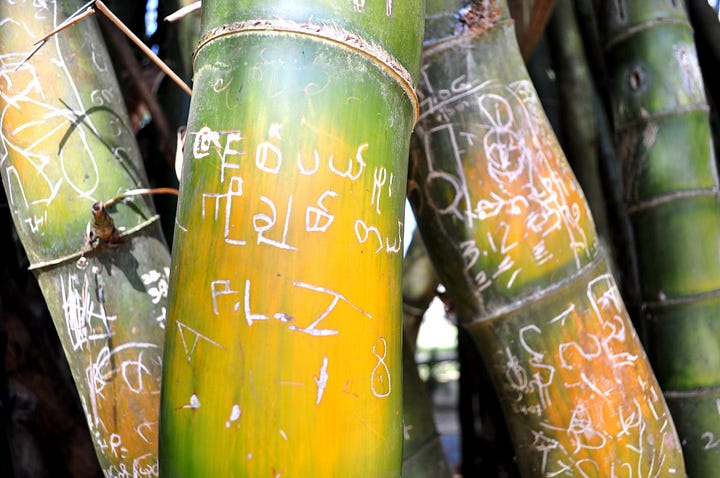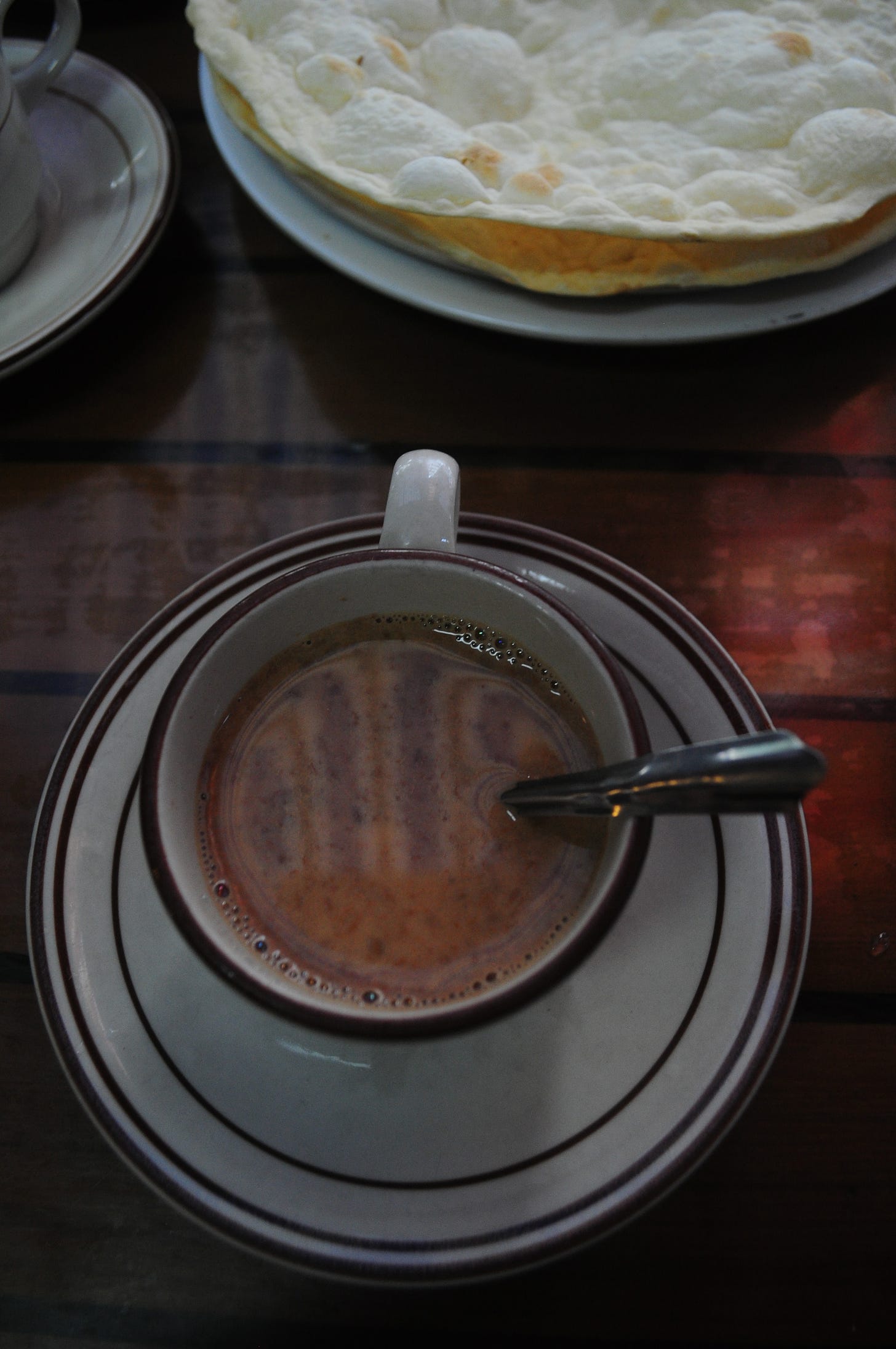Strangers Talk About Me
Or ways that learning Burmese shaped me
Hello friends, welcome back,
Today, we are starting, in a lecture hall in London, listening to a talk about studying a foreign language as part of my Master’s Degree.
“This is a chance to explore new things,” the professor told us. “It’s an opportunity to try learning Cambodian … or Burmese...”
A few people laughed.
I lazily thought, ‘Why would I learn Burmese?’ I spoke French, Spanish, Italian and some Arabic. Mostly learned through working in different countries. I thought this was pretty good for a native English speaker. These were all languages I considered to be spoken by significant percentages of the world’s population to be classified as ‘useful’, especially as I was trying to build a career in the competitive International Development sector.
Life surprises you
Less than two years later, I found myself moving to Burma. It was a country I never expected to live in and a job which I never expected to get. But my manager thought I was the right candidate, and so I found myself, unexpectedly in Yangon, trying to understand a country which was opening its borders after years of restrictions.
On my first day at work, one of my colleagues wrote down my important addresses in the curly fat letters of the Burmese script. I used this piece of paper to get around the city, pointing to my home address or office address so that taxi drivers would know where I wanted to go.
It felt like a revealing of my vulnerability - an act of trust in strangers.


After spending the first month mastering the word for thank you, failing to accurately pronounce the unfamiliar names of my colleagues and designing a creative sign language. I decided it was probably a good idea to try to learn Burmese.
Despite, its immediate usefulness, I was still reluctant to learn the language. I only had a year contract and the country felt very foreign to me.
“Is there any point?” I complained to a friend. “Once I leave Burma, I will never speak Burmese again. And there are 135 ethnic groups, all with their own languages. Will Burmese even be useful outside Yangon?”
I thought for a moment: “The only point of learning Burmese would be if, one day, I were to be somewhere and two strangers were gossiping about me in Burmese. And I could understand what they said, turn around and catch them out.”
“That and communicating with people in Yangon,” replied my friend.
“And that,” I agreed, finally accepting that I was going to have to go through a process of adjusting to this new country.
Basics in Burmese
I kept trying to avoid the work of learning. I tried to get away with only learning to speak. I had recently mastered the Arabic alphabet and another new alphabet felt like too much too soon.
This smart ‘shortcut’ did not get me beyond ordering juice and so, I resigned myself to learning those curvy letters.
The alphabet itself, it turned out, was not as confusing as it looked and I gained a sudden naive confidence that this would be easy.
I was, of course, wrong.
Because reading Burmese does not come from learning single letters - but from combinations of those letters - which make up ‘rhymes’.
Learning the letters of the alphabet is just the beginning, as each letter is a mere component of a greater sound-making structure, like a singer is a component in a choir.
You start with a letter.
To it, you may add vowels. The letter and the vowel make a certain sound. That may be enough.
Or you may need to add another consonant, which changes the main consonant. So a ‘ha’ may become ‘hla’; or a ‘pa’ a ‘pwa’.
Then there may be a glottal stop or a glide, which further affects the pronunciation. There are eight glottal stops/glides and each one has a different effect on the sound.
Then, finally, you may add a tone: there are three tones: low, creaky and high.
Through this process, I learnt there are new sounds, many of which my mouth had never had to make. My tongue was pulled apart, my throat doing acrobatics. And the Burmese language wove a stick, always saying, no you missed a bit.
It makes sense if you think about it
I thought back to the A,B,C I learned in my Scottish Primary School. At the time they seemed an absolute authority but in Myanmar, they had become unreliable. There were other letters, other rules. To apply the new rules meant accepting a new structure and to learn this structure, something in me also had to change.
“The colours are verbs in Burmese” my teacher would announce, or some other factual bit of information which seemed to conflict with my understanding of the world. When I would ask why, she would say, “Well, it makes sense if you think about it.”
And so, I thought about it.
I thought about how language undoes you. It undoes your ABCs. It requires you to develop a child’s mind, to be able to try saying things, to be willing to get them wrong. Not going into the world as an expert, but instead going in trying to work it out.
I thought about how this was different from the way that many aid conversations are framed - which assume Western expertise and authority.
I started to be curious about the new sounds and words. I found a lot of freedom in saying it all wrong. I found a lot of softness in exploring.

All the names for tea
I enjoyed the array of words Burmese had for certain objects (like baskets) when in English there is only one option. The multitude of names for a cup of tea, depending on your preferred combination of milk, sugar and tea.
I enjoyed the word combinations, like toilet, which in Burmese is: ‘pleasant room’, or banana which in Burmese translates as: ‘bird speak fruit’. Cleaning your teeth, cleaning the dishes, cleaning your clothes, cleaning the floor, all require different verbs. Being lazy, I assumed that it could learn only one word for all of these activities - which of course did not work.
Burmese was hard to memorise, hard to read, hard to follow. In particular, there were no Western language reference points I could latch onto. Everything had to be learned anew.
Strangers watch me eat noodles
The more I learnt, the more comfortable life in Burma became. Sometimes, I had empowering exchanges which I would leave feeling I had mastered this foreign tongue. Others, dispiriting, in which I felt that despite months of study and practice, people would reply to my question with a panicked ‘No’.
This was the first language I had learned, which inspired native speakers to exclaim how clever I was for knowing words. I would be invited for tea by people on the street. Taxi drivers asked me about my favourite foods. I was asked to marry kindly market sellers’ sons.
Restaurant owners would call in people from the street, so they could all gather around and watch me eat bowls of noodles, all because I knew how to say things in Burmese.
There is humility in getting it wrong.
There is also humility in having ten people watch you eat a bowl of noodles because they can’t believe a foreign person would ever be able to speak their language. Although sometimes I was too tired to be watched eating my dinner, I did understand that I was speaking the language of a country which had been closed off from the outside world for a very long time.

Finding home through words
While Myanmar was foreign when I arrived, learning Burmese was a binding factor in building friendships. Even though I was far from fluent, it gave me a sense of appreciation for the country’s sense of humour, culture and stories. It bound me to people, it bound me to their place.
I arrived on a one-year contract, I ended up working for nine years in Myanmar. I found a sense of home, very far from where I was born.
And in the morning, I used to say hello to all the people in my street: fruit sellers, cafe workers, taxi drivers. Relationships which I built through talking in Burmese about holidays, family, the weather, food.
Each morning, they would wave and shout:
“Ay, ay, nay kaun, la? Hey, hey, how are you?”
And whatever mood I was in when I left the house in, by the time I got to the end of the road. I was smiling.
And by chance, one evening in Yangon, I met the lecturer who had given the talk at my university and I told him my reaction, as well as my experience of learning Burmese.
“I think now,” I said, “when I go back to Europe I will need to find a Burmese community. And I will need to keep coming back to Burma, just so I can speak the language.”
And he laughed as if he knew this all along.
Oh and one final thing.
One day, I did overhear two people talk about me in Burmese, in a supermarket, and I turned around and replied in Burmese.
And for that one moment, seeing the surprise on their face - all the effort of learning this difficult language - one hundred per cent worth it.
A moment to mention the conflict in Myanmar
In sharing this piece, I want to take a moment to mention the under-reported conflict in Myanmar and the many Myanmar citizens taking daily risks for their political freedom.
Studies show Myanmar is facing the highest level of conflict worldwide (and the second deadliest - after Ukraine).
Since the coup d’etat in 2021, over 50,000 people have lost their lives and over 20,000 people have been imprisoned for their political beliefs.
I also want to mention the impact that British colonial occupation had on Myanmar. That is not to cast blame, but to remember, that we live in a connected but also unequal world, impacted by these past legacies.
(NB: I use the terms Myanmar and Burma to refer to the same territory. There are political histories behind both names for the country and I have become used to applying each in different contexts).
Walk With Me
Tell me:
Has learning a language changed how you see the world?
What other than language has helped you connect to other people more deeply?
What language do you wish you could speak?



This is a brilliant piece of writing Catriona. As somebody who has struggled for years to learn basic French, this article has really encouraged me to try again. I recently started learning a few Spanish words in preparation for an upcoming holiday and I was amazed at how much simpler the grammar was than French – at least in my opinion. However, something keeps drawing me back to the beautiful French language. I keep telling myself it cannot be impossible because children and adults learn it. I look at how young children pick up fluent language in a few short years and think to myself ‘why is this so difficult for me?’ Well done for persevering with the Burmese language and I hope you continue to enjoy all its nuances.
I so admire your writing and perseverance in learning Burmese - the connections you can make simply through knowing a other language is incredible. I'm ashamed at my own lack of skill in using other languages - it's something I seek to rectify.